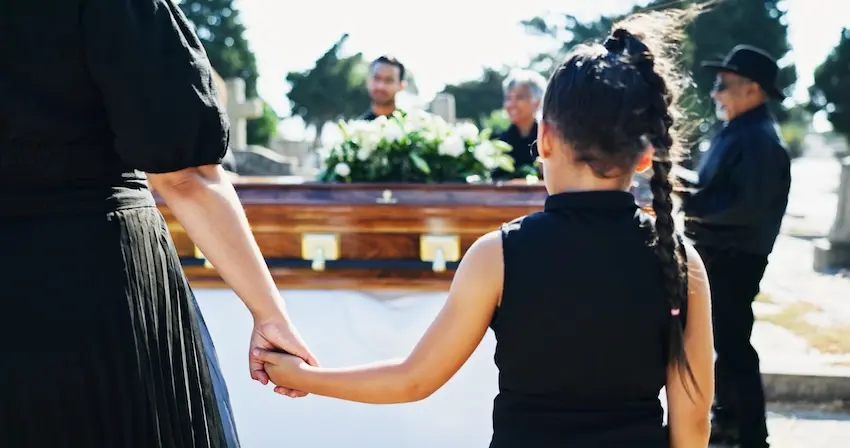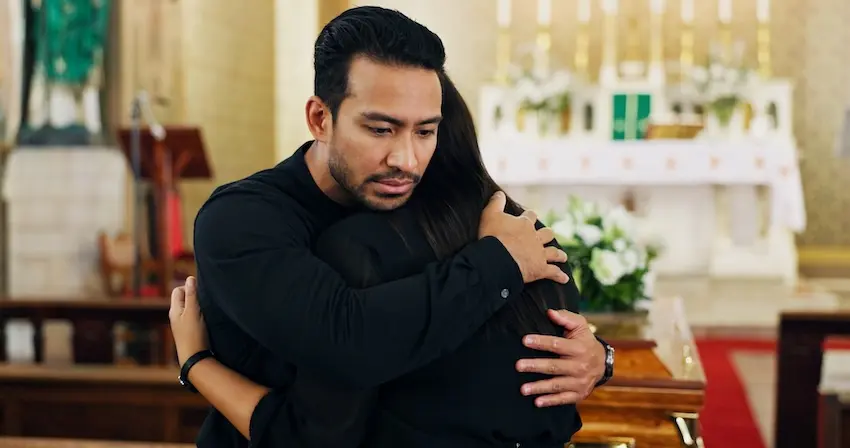Atlanta Wrongful Death Attorney
Compassionate Legal Representation for Families Who Have Lost Loved Ones to Preventable Deaths

Fighting for Justice When Negligence Takes a Life
Personalized Representation
When a family member dies due to someone else’s negligence, recklessness, or intentional actions, the emotional devastation is compounded by the immediate need to make critical legal decisions during an impossible time.
Amircani Law provides wrongful death representation throughout Atlanta and surrounding Georgia communities with the understanding that no legal outcome can restore what has been lost, but securing justice and accountability can provide a measure of closure while protecting your family’s financial future.
Experience You Can Trust
As an Atlanta wrongful death lawyer who has represented grieving families throughout Fulton County, DeKalb County, Cobb County, and surrounding jurisdictions, Maha Amircani understands the unique challenges Atlanta families face when pursuing wrongful death claims.
At Amircani Law, we take the time to understand not just the legal aspects of your wrongful death case, but the personal impact this tragedy has had on your daily life, your family dynamics, and your financial stability.
What Qualifies as Wrongful Death Under Georgia Law in Atlanta?
Wrongful death occurs in Atlanta when a person’s death is caused by the negligent, reckless, intentional, or criminal act of another individual, company, or entity, and the deceased person would have had the right to file a personal injury lawsuit had they survived the incident.
Under Georgia’s wrongful death statute, these claims allow surviving family members to recover the full value of the life of the deceased, which includes both economic losses such as lost income, benefits, and services the deceased would have provided, as well as the intangible value of the deceased’s life including companionship, guidance, protection, and the continuation of their presence in the family unit.
Traffic Fatalities
Fatal car accidents on I-85, I-75, and I-20, deadly truck collisions, motorcycle crashes, and pedestrian fatalities in Midtown, Buckhead, and downtown Atlanta
Medical Negligence
Surgical errors, anesthesia mistakes, delayed diagnosis, hospital-acquired infections, and birth injuries at Atlanta medical facilities
Workplace Deaths
Fatal construction accidents, industrial facility incidents, falls from heights, and equipment malfunctions at Atlanta job sites
Premises Liability
Slip and fall fatalities, inadequate security leading to violent crimes, swimming pool drownings, and defective property conditions
Nursing Home Abuse
Neglect, malnutrition, dehydration, medication errors, and failure to provide necessary medical attention in Atlanta senior facilities
Product Defects
Dangerous consumer goods, defective vehicles, faulty safety equipment, and inadequate warnings causing fatal injuries
The legal framework for wrongful death claims in Georgia is distinct from other states, requiring specific statutory compliance and an understanding of how Atlanta and Georgia courts interpret the full value of life concept that forms the foundation of these claims.
An experienced Atlanta wrongful death lawyer at Amircani Law navigates the complex interplay between wrongful death claims brought on behalf of the estate to recover the full value of the deceased’s life, and separate survival action claims that recover damages the deceased experienced between the time of injury and death, including pain and suffering, medical expenses, and lost wages during that period.
Who Can File a Wrongful Death Lawsuit in Atlanta, Georgia?
Surviving Spouse (First Priority)
The surviving spouse has the first right to bring the wrongful death action and recover damages on behalf of the deceased’s estate and surviving family members.
Children (Second Priority)
When there is no surviving spouse, the deceased’s children have the right to file the wrongful death claim and share equally in any recovery. Minor children must be represented by a court-appointed legal guardian.
Parents (Third Priority)
In cases where the deceased had no surviving spouse or children, the deceased’s parents have standing to file the wrongful death action and recover damages for the loss of their child.
Estate Administrator (Final Priority)
If no parents survive, the administrator or executor of the deceased’s estate may bring the claim on behalf of the estate and any next of kin.
Determining the proper party to file a wrongful death lawsuit in Atlanta requires careful examination of family relationships, marital status at the time of death, and the legal rights of all potential beneficiaries to ensure compliance with Georgia law and avoid procedural challenges that could delay or jeopardize your family’s claim.
Amircani Law assists Atlanta families in navigating these complex standing requirements, particularly in situations involving blended families, estranged relationships, disputes among potential beneficiaries, or questions about the legal validity of marriages.



Why Choose Amircani Law for Your Atlanta Wrongful Death Case: Maha Amircani’s background representing individuals and families—never corporations—means your wrongful death case receives the personalized attention and genuine commitment that defines our practice. We understand that you are entrusting us with honoring your loved one’s memory through the legal process, and we approach every wrongful death case with the respect, sensitivity, and determination your family deserves during this difficult time.
How Much Is a Wrongful Death Case Worth in Atlanta?
Economic Damages
The economic component includes the present value of lost future earnings the deceased would have provided to their family, lost benefits including health insurance and retirement contributions, the value of household services the deceased performed, and funeral and burial expenses. These tangible losses require sophisticated economic analysis and expert testimony to accurately project over the deceased’s expected lifetime.
Intangible Value of Life
The full value of life encompasses the loss of companionship, love, affection, guidance, and counsel the deceased provided to their spouse and children, the loss of parental nurturing and instruction for minor children who will grow up without their mother or father, and the incalculable value of the deceased’s continued presence in family life for years and decades to come.
The value of a wrongful death case in Atlanta depends on numerous factors including the deceased’s age, health, life expectancy, earning capacity, education, skills, and the financial and intangible contributions they made to their family and community throughout their life. Georgia law requires wrongful death damages to encompass the full value of the life of the deceased, which combines both economic and non-economic elements to truly reflect what has been lost.
Calculating wrongful death damages in Atlanta requires sophisticated economic analysis combined with compelling presentation of the human loss that has occurred, utilizing expert testimony from economists who project lifetime earnings, vocational specialists who assess the deceased’s career trajectory, and family members who can articulate the profound void left in their lives. An experienced Atlanta wrongful death attorney at Amircani Law works with these experts to build a comprehensive damages case while also presenting the human story of who your loved one was, their relationships, their contributions to family and community, their future plans and aspirations, and the devastating impact their absence has created for those left behind.
How Do You Prove Negligence in an Atlanta Wrongful Death Case?
Investigation
Immediate scene investigation, evidence preservation, police and incident reports, witness interviews
Expert Analysis
Accident reconstructionists, medical experts, industry safety specialists, vocational counselors
Physical Evidence
Scene photography, video footage, damaged vehicles/equipment, medical records, defective products
The duty of care varies depending on the circumstances of the wrongful death, with drivers owing a duty to operate vehicles safely and follow traffic laws, property owners owing a duty to maintain reasonably safe premises and warn of known hazards, healthcare providers owing a duty to provide treatment meeting accepted medical standards, and employers owing a duty to provide safe working environments complying with applicable safety regulations.
Establishing breach of duty requires demonstrating through evidence that the defendant’s conduct fell below what a reasonable person or entity would have done under similar circumstances.
Amircani Law builds comprehensive wrongful death cases by immediately investigating the incident scene before evidence is lost or destroyed, obtaining police reports, incident reports, and all documentation related to the death, interviewing eyewitnesses who can provide testimony about what occurred, and securing expert witnesses who can explain how the defendant’s conduct caused the death and how the death could have been prevented.
Physical evidence plays a crucial role in proving negligence, including photographs and video footage, damaged vehicles or equipment, defective products, dangerous property conditions, and medical records documenting the injuries and treatment provided before death occurred.
Meet Your Atlanta Wrongful Death Attorney
Maha Amircani founded Amircani Law in 2013 with a clear mission: to provide high-quality, creative, and result-oriented legal representation focused on individuals and families, not corporations.
Maha obtained her B.A. in International Affairs from The University of Georgia with a concentration on Human Rights. She graduated Cum Laude from Georgia State University College of Law.
She is licensed to practice in the Superior Courts of Georgia, the Georgia Court of Appeals, the Georgia Supreme Court, and the United States District Courts for the Northern and Middle Districts of Georgia.

What Compensation Can Families Recover in Atlanta Wrongful Death Cases?
Georgia’s wrongful death statute provides for recovery of the full value of the life of the deceased from a financial perspective, encompassing all economic contributions the deceased would have made to their family throughout their expected lifetime, calculated to present value using economic principles and expert testimony.
For Surviving Spouses
Wrongful death compensation recognizes the loss of a marriage partner including intimacy, emotional support, household management collaboration, and the shared future plans that death has permanently destroyed.
Georgia law requires that surviving spouses receive at least one-third of the wrongful death recovery even when children are also beneficiaries.
For Children
Children’s damages reflect the profound loss of a parent’s guidance through critical developmental years, assistance with education, moral instruction, protection, and the basic security that comes from having both parents present.
The loss extends throughout their lifetime as they face major life events without their parent’s presence.
Economic Damages: Quantifying Financial Losses
Lost Future Earnings
The present value of all wages, salary, bonuses, commissions, and income the deceased would have earned from the date of death through their expected retirement age, adjusted for promotions, raises, and career advancement the deceased would have reasonably achieved based on their education, skills, work history, and industry standards.
Lost Benefits & Compensation
Health insurance coverage, dental and vision benefits, life insurance policies, retirement account contributions including 401(k) matching, pension accruals, stock options, profit sharing, paid time off, disability insurance, and all other employment benefits that provided financial security and value to the family beyond base salary.
Household Services Value
The replacement cost of all domestic labor the deceased performed including childcare and parenting duties, meal preparation and cooking, cleaning and housekeeping, home maintenance and repairs, yard work and landscaping, vehicle maintenance, financial management, tax preparation, and countless other services that now must be hired out or performed by surviving family members.
Medical Expenses Before Death
Emergency medical transport, emergency room treatment, hospitalization, surgical procedures, intensive care unit stays, diagnostic imaging, laboratory tests, physician services, prescription medications, medical equipment, and all healthcare costs incurred treating injuries between the time of the incident and the deceased’s death, recovered through a survival action claim.
Loss of Inheritance
The value of wealth accumulation, property acquisition, retirement savings, investment growth, and assets the deceased would have accumulated over their lifetime and passed to heirs, representing the long-term financial impact that extends to future generations who will never benefit from the deceased’s earning capacity and financial planning.
Intangible Value of Life: Non-Economic Damages
Loss of Companionship & Consortium
For surviving spouses, this encompasses the loss of marital partnership, intimacy and sexual relations, emotional support during life challenges, shared decision-making and household collaboration, companionship and friendship, the comfort of daily presence, participation in family activities and social events, shared hobbies and interests, travel and experiences together, and the future retirement years that were planned but will never occur. Atlanta courts recognize that spouses lose not just a provider but their life partner, confidant, and the person with whom they expected to grow old, making this component of damages substantial in wrongful death cases involving married couples.
Loss of Parental Guidance & Nurturing
Children who lose a parent suffer damages including the loss of love, affection, and nurturing during critical developmental years, guidance on education choices and career decisions, moral and ethical instruction, discipline and structure, protection and security, help with homework and school activities, attendance at games and performances, teaching life skills from driving to cooking, advice on relationships and friendships, support during teenage challenges, college guidance, wedding planning participation, and presence at graduations, marriages, and the birth of grandchildren. The younger the child at the time of death, the greater the lifetime loss as they navigate decades of life milestones without their parent’s presence, wisdom, and support.
Loss of Love & Affection
The intangible emotional bonds, expressions of love, physical affection, words of encouragement, and daily demonstrations of care that created the fabric of family relationships and can never be replaced or replicated by anyone else.
Loss of Life’s Enjoyment
Participation in family celebrations, holiday gatherings, birthday parties, vacations, weekend activities, Sunday dinners, game nights, and all the shared experiences that create family memories and bring joy to daily life.
Loss of Protection & Security
The sense of safety, security, and stability that comes from having a parent, spouse, or family member present, including both physical protection and the emotional security of knowing someone is there during difficult times and life challenges.
Punitive Damages: Punishing Egregious Conduct
In wrongful death cases involving particularly egregious conduct beyond ordinary negligence, Georgia law allows for punitive damages designed to punish the defendant and deter similar behavior by others. These damages require clear and convincing evidence of willful misconduct, malice, fraud, wantonness, oppression, or that entire want of care which would raise the presumption of conscious indifference to consequences.
Punitive damages are awarded to the estate rather than directly to family members and are capped at $250,000 in most cases, though exceptions exist for product liability cases and defendants convicted of certain criminal conduct related to the wrongful death.
Common scenarios warranting punitive damages in Atlanta wrongful death cases include drunk driving accidents where the at-fault driver had a blood alcohol content significantly above the legal limit or prior DUI convictions, hit-and-run fatalities where the defendant fled the scene demonstrating conscious disregard for the victim’s life, nursing home deaths involving systematic neglect and deliberate understaffing to maximize profits, corporate decisions to knowingly market dangerous products despite awareness of fatal risks, and intentional acts or reckless conduct demonstrating complete disregard for human safety.
An Atlanta wrongful death lawyer at Amircani Law evaluates whether punitive damages may be available in your case and presents the compelling evidence necessary to meet Georgia’s heightened burden of proof for these exemplary damages that go beyond compensating your family to making a societal statement about unacceptable conduct.
Survival Action: Pre-Death Pain & Suffering
Separate from the wrongful death claim itself, Georgia law allows the estate to pursue a survival action for damages the deceased personally experienced between the time of injury and death, including conscious pain and suffering the deceased endured while aware of their fatal injuries, mental anguish and emotional distress from knowing they were dying, fear and terror experienced during the incident or in its aftermath, physical pain from injuries sustained, and the loss of enjoyment of life during the period between injury and death.
These survival action damages belong to the deceased’s estate and are distributed according to the will or Georgia’s intestacy laws rather than following wrongful death distribution rules, though they are typically pursued simultaneously with the wrongful death claim in a single lawsuit to maximize total recovery for the family.
The value of survival action claims depends heavily on how long the deceased survived after the fatal incident and their level of consciousness during that period, with cases involving prolonged conscious suffering before death commanding higher damages than instantaneous death scenarios.
Medical records, emergency responder testimony, witness accounts, and expert medical testimony establish what the deceased experienced during their final moments or days, allowing juries to compensate the estate for this distinct harm that belongs to the deceased rather than to surviving family members, though ultimately benefits the family as estate beneficiaries.
How Long Do I Have to File a Wrongful Death Lawsuit in Atlanta?
Georgia law imposes a two-year statute of limitations for wrongful death claims, meaning the lawsuit must be filed within two years from the date of the deceased’s death, not from the date of the incident that caused the injuries if death occurred some time after the initial accident or incident.
This strict deadline is rigidly enforced by Atlanta courts, and failing to file a wrongful death lawsuit within the two-year limitation period will result in permanent loss of your family’s right to pursue compensation regardless of how strong your case may be or how clearly the defendant’s negligence caused your loved one’s death.
Standard Deadline
Two years from date of death for most wrongful death claims in Georgia
Government Claims
6 months to 1 year ante litem notice for claims against City of Atlanta, MARTA, or Georgia agencies
Medical Malpractice
Special statute of repose rules may apply depending on when negligent act occurred versus when death resulted
Despite the two-year deadline, wrongful death cases should never be delayed because critical evidence deteriorates, disappears, or becomes inaccessible as time passes, including accident scene physical evidence that is repaired or removed, surveillance footage that is recorded over or deleted, witnesses whose memories fade or who become unavailable, and medical records that can be more difficult to obtain as time elapses from the date of death.
Amircani Law urges Atlanta families to consult with a wrongful death lawyer as soon as possible after losing a loved one to ensure all evidence is preserved through spoliation letters demanding that defendants maintain relevant evidence, witnesses are interviewed while memories are fresh, and a thorough investigation is conducted before the scene changes or responsible parties alter conditions that contributed to the death.
How Does Amircani Law Handle Wrongful Death Cases in Atlanta?
Compassionate Consultation
We begin with a comprehensive, free consultation where we take time to understand not just the legal facts of your case, but who your loved one was, their role in your family, the impact their death has created, and your family’s objectives in pursuing a wrongful death claim.
Thorough Investigation
We conduct comprehensive investigations into the circumstances surrounding the death, visiting accident scenes, examining all physical evidence, reviewing reports and documentation, interviewing witnesses, and consulting with experts who provide specialized knowledge.
Building Your Case
We assemble compelling evidence packages demonstrating both liability and damages, working with economic experts, medical specialists, and gathering testimony from family members and community members who can articulate your loved one’s unique value.
Aggressive Advocacy
We handle all communications and negotiations with insurance companies and defense attorneys, shielding you from aggressive tactics while pursuing maximum compensation. If fair settlement cannot be achieved, we have the trial experience to present your case to a jury.
Throughout the wrongful death claims process, we keep you informed about developments in your case, explain complex legal concepts in understandable terms, involve you in all significant decisions while never pressuring you to accept settlements you are uncomfortable with, and remain accessible to answer questions and provide support during what we understand is an extraordinarily difficult time.
Our commitment extends beyond just the legal work, as we connect families with resources including grief counselors, financial advisors, and support groups that can help you navigate the practical and emotional challenges of life after wrongful death.
Contact an Atlanta Wrongful Death Lawyer Today
If you have lost a loved one due to someone else’s negligence in Atlanta or anywhere in Georgia, Amircani Law is here to provide the compassionate, skilled legal representation your family deserves.
Frequently Asked Questions About Atlanta Wrongful Death Claims
Can I file a wrongful death claim if my loved one was partially at fault for the accident in Atlanta?
Georgia applies a modified comparative negligence standard to wrongful death cases, allowing you to pursue a claim even if your loved one bore some responsibility for the accident, provided their fault does not exceed 49 percent of the total negligence that caused the death.
If your loved one is found to be 49 percent or less at fault, your family can still recover damages, though the compensation will be reduced proportionally by the percentage of fault attributed to the deceased, meaning a wrongful death case valued at one million dollars where the deceased is found 30 percent at fault would result in a recovery of $700,000 after the reduction.
An experienced Atlanta wrongful death lawyer works to minimize any comparative fault assigned to your loved one by presenting evidence demonstrating that the defendant’s negligence was the primary cause of the death, challenging the defense’s attempts to shift blame onto the victim through reconstruction of the accident sequence, and arguing that even if your loved one made a minor mistake such as not wearing a seatbelt or being slightly over the speed limit, the defendant’s actions such as running a red light while texting or driving drunk were substantially more negligent and directly caused the fatal outcome.
If the deceased is determined to be 50 percent or more at fault, Georgia law completely bars recovery of any wrongful death damages under the modified comparative negligence rule, making the fault determination absolutely critical to your family’s ability to obtain any compensation whatsoever, which is why insurance companies aggressively try to assign majority fault to deceased victims who cannot defend themselves or testify about what actually occurred during the fatal incident.
What if the person responsible for the wrongful death has no insurance in Georgia?
When the person whose negligence caused your loved one’s death has no insurance or insufficient insurance coverage to compensate your family’s losses, an Atlanta wrongful death attorney explores multiple alternative sources of compensation including your own insurance policies that may provide uninsured motorist coverage or underinsured motorist coverage protecting your family when the at-fault party lacks adequate insurance, with these UM/UIM policies often providing hundreds of thousands of dollars in additional recovery beyond the defendant’s limited or nonexistent coverage.
Additional potential sources include homeowner’s insurance policies that may cover certain premises liability deaths, umbrella insurance policies that provide excess liability coverage beyond primary policies, commercial general liability policies when businesses are involved in the wrongful death, and personal assets owned by the defendant including real estate, vehicles, bank accounts, investment accounts, and business interests that could be subject to collection if a judgment is obtained through litigation.
In cases involving commercial defendants such as trucking companies, corporations, hospitals, or business entities, multiple layers of insurance policies often apply including primary liability coverage, excess policies, and umbrella coverage that can provide tens of millions of dollars in available compensation even when one policy is exhausted.
Some wrongful death cases involve multiple liable parties whose combined insurance policies and assets can satisfy a substantial judgment even if one defendant is completely uninsured, which is why thorough investigation to identify all potentially responsible parties is crucial to maximizing recovery. Amircani Law conducts comprehensive asset searches and insurance investigations to identify every possible source of compensation for your wrongful death claim, recognizing that your family faces enormous financial burdens following the loss of a loved one and deserves every available dollar to be pursued through aggressive legal action against all responsible parties and their insurers.
How are wrongful death settlements distributed among family members in Atlanta?
Georgia law establishes specific mandatory rules governing how wrongful death compensation is distributed among surviving family members, with the distribution depending entirely on who survives the deceased and their legal relationship to the decedent at the time of death, and these statutory distribution requirements cannot be altered by agreement among family members or by the deceased’s will.
When both a surviving spouse and children exist, the spouse and children share the wrongful death recovery with the surviving spouse receiving no less than one-third of the total amount regardless of how many children survive, meaning in a family with a surviving spouse and three children, the spouse receives at least one-third and the three children divide the remaining two-thirds equally, though the spouse may receive more than one-third depending on the specific circumstances and evidence presented about the marital relationship.
If there is a surviving spouse but no children or other descendants, the surviving spouse receives the entire wrongful death recovery as the sole beneficiary of the claim with no sharing required with parents or other family members of the deceased. When children survive but no spouse exists because the deceased was unmarried, divorced, or widowed at the time of death, all children share the wrongful death recovery in equal shares regardless of their ages, with the court appointing a guardian ad litem to represent minor children’s interests and potentially establishing trusts or structured settlements to preserve funds until children reach adulthood rather than distributing large sums to young children.
If the deceased had no surviving spouse, children, or other descendants, the deceased’s parents have the right to file the wrongful death claim and share the recovery equally between mother and father if both survive, or the surviving parent receives the entire amount if only one parent is living.
When no spouse, children, or parents survive the deceased, the administrator or executor of the deceased’s estate brings the wrongful death claim and any recovery becomes part of the estate to be distributed to next of kin according to Georgia’s intestacy statutes, which distribute assets to siblings, grandparents, aunts, uncles, and more distant relatives in a specific order of priority established by law.
Do I have to pay taxes on wrongful death settlements in Georgia?
Wrongful death compensation received by surviving family members in Georgia is generally not subject to federal income tax or Georgia state income tax under Internal Revenue Service rules that exempt compensation received on account of personal physical injuries or physical sickness from gross income, meaning the full amount your family receives for the wrongful death of your loved one can be used for your family’s needs without owing income taxes on the recovery.
The tax exemption applies to all components of wrongful death damages including compensation for the full value of the deceased’s life, lost future earnings, lost benefits, loss of companionship, and all other elements of the wrongful death award, though there is one significant exception that surviving families must understand to avoid unexpected tax liability.
Punitive damages awarded in wrongful death cases are specifically taxable as ordinary income under federal tax law even though compensatory damages are exempt, meaning if your wrongful death case includes a punitive damages award to punish the defendant for particularly egregious conduct, that portion of the recovery must be reported as taxable income on both federal and Georgia state income tax returns in the year received.
Interest that accrues on a wrongful death judgment from the date of verdict until the defendant pays the award is also considered taxable income rather than tax-exempt personal injury compensation, as are investment earnings generated after you receive and deposit the wrongful death settlement funds into bank accounts or investment accounts. Survival action damages recovered for the deceased’s pre-death pain and suffering, medical expenses, and lost wages are also generally tax-exempt as compensation for personal physical injuries, though any portion allocated to property damage would be taxable and subject to capital gains analysis.
An Atlanta wrongful death attorney at Amircani Law works with tax professionals when structuring large wrongful death settlements to minimize any potential tax liability, exploring options such as structured settlements that provide periodic payments over time rather than lump sums, allocating settlement proceeds to maximize tax-exempt portions, and ensuring proper documentation of the settlement allocation to support the tax treatment if the IRS ever questions the exclusion from income.
Your wrongful death lawyer should provide a settlement allocation agreement or court order that clearly identifies what portion of the recovery constitutes tax-exempt compensatory damages versus any taxable punitive damages or interest, allowing you to accurately report the settlement on your tax returns and claim the appropriate exemption for the compensatory portion of your wrongful death award.
Can I sue my family member's employer for wrongful death in Atlanta?
Georgia’s workers’ compensation system generally provides employers with immunity from wrongful death lawsuits filed by surviving family members, meaning you typically cannot sue your loved one’s employer directly for wrongful death even when the employer’s negligence caused the fatal workplace accident, though you can pursue workers’ compensation death benefits that provide burial expenses up to $10,000 and weekly income benefits to surviving spouses and dependent children.
The workers’ compensation exclusive remedy rule represents a trade-off where employees and their families receive guaranteed benefits regardless of fault in exchange for giving up the right to sue employers in civil court for full wrongful death damages, which often results in substantially less compensation than a successful wrongful death lawsuit would provide since workers’ compensation does not compensate for pain and suffering, loss of companionship, or the full value of life that wrongful death claims recover.
However, an experienced Atlanta wrongful death lawyer can identify important exceptions and third-party claims that allow families to recover full compensation beyond limited workers’ compensation benefits, starting with third-party liability claims against equipment manufacturers whose defective products caused the workplace death, general contractors or subcontractors whose negligence created dangerous conditions at a worksite where your family member was employed, property owners who failed to maintain safe premises, drivers of vehicles not owned by the employer who caused fatal traffic accidents, and any other individuals or companies besides the direct employer whose negligence contributed to the wrongful death.
In cases involving intentional employer conduct or egregious safety violations that demonstrate willful and wanton disregard for employee safety rising beyond ordinary negligence, very limited exceptions to workers’ compensation immunity may allow direct lawsuits against employers, though these circumstances are rare and require substantial evidence that the employer specifically intended to cause harm or engaged in conduct virtually certain to cause death or serious injury.
Amircani Law thoroughly investigates workplace wrongful deaths to identify all potential liable parties and sources of compensation, pursing workers’ compensation death benefits while simultaneously investigating third-party claims against equipment manufacturers, contractors, property owners, and other negligent parties, often recovering substantial additional compensation beyond workers’ compensation through these third-party wrongful death lawsuits that provide full damages for the loss of your family member who was killed while working to provide for your family’s future.
What happens if the wrongful death defendant declares bankruptcy in Atlanta?
When a wrongful death defendant files for bankruptcy protection in Atlanta, either before you file your wrongful death lawsuit or during the litigation process, the bankruptcy triggers an automatic stay that halts all collection efforts and legal proceedings against the debtor, though the impact on your family’s wrongful death claim depends on whether the defendant has liability insurance coverage, the type of bankruptcy filed, and the timing of the bankruptcy relative to your wrongful death case.
If the wrongful death defendant carries liability insurance such as auto insurance, homeowner’s insurance, or business liability coverage, the bankruptcy of the individual defendant typically does not prevent you from pursuing claims directly against the insurance company up to policy limits, because insurance proceeds are not property of the bankruptcy estate and insurance companies remain obligated to defend and indemnify their insureds regardless of bankruptcy status.
Your Atlanta wrongful death attorney can request relief from the bankruptcy automatic stay to continue prosecuting your wrongful death lawsuit against the defendant and their insurance carriers, which bankruptcy courts routinely grant when insurance coverage exists because allowing the case to proceed does not harm other creditors since any judgment will be satisfied by insurance rather than the debtor’s personal assets.
In cases where the wrongful death defendant has no insurance or insufficient insurance to fully compensate your family’s losses, bankruptcy becomes more problematic because wrongful death claims are treated as unsecured debts in bankruptcy that must compete with other creditors for payment from limited bankruptcy estate assets, often resulting in pennies on the dollar recovery or complete discharge of the debt with no payment to the family.
Chapter 7 bankruptcy liquidates the debtor’s non-exempt assets and discharges remaining debts including wrongful death judgments, while Chapter 13 bankruptcy creates a repayment plan over three to five years that may provide some recovery depending on the debtor’s income and other obligations, though most families recover far less than the true value of their wrongful death claim when defendants successfully discharge liability through bankruptcy.
However, Georgia law and federal bankruptcy law provide that debts arising from willful and malicious injury cannot be discharged in bankruptcy, meaning if your wrongful death case involves intentional conduct such as assault, murder, or drunk driving that demonstrates willful and wanton behavior, your wrongful death judgment may survive the bankruptcy and remain collectible against the defendant’s future assets and income even after bankruptcy discharge.
Amircani Law acts quickly when bankruptcy threatens a wrongful death claim, immediately pursuing insurance coverage, requesting relief from the automatic stay, filing appropriate claims in the bankruptcy proceeding to preserve your rights, and exploring whether the wrongful death qualifies as a non-dischargeable debt that will remain enforceable against the defendant regardless of bankruptcy outcome.
Can I file a wrongful death lawsuit if there was a criminal case in Atlanta?
You absolutely can and should file a wrongful death lawsuit in Atlanta even when criminal charges have been filed against the person who caused your loved one’s death, because criminal cases and civil wrongful death cases are completely separate legal proceedings with different purposes, different standards of proof, different rules of evidence, and different outcomes that do not depend on each other.
Criminal cases are brought by the State of Georgia to punish criminal conduct and protect society through incarceration, probation, and fines that go to the government, while wrongful death lawsuits are civil cases filed by surviving family members to obtain financial compensation for the losses your family has suffered due to the death of your loved one. The criminal justice system requires proof beyond a reasonable doubt, the highest burden of proof in American law, while wrongful death cases require only a preponderance of the evidence showing that it is more likely than not that the defendant’s negligence caused the death, making it possible to win a wrongful death case even when criminal charges result in acquittal because the lower civil burden of proof is easier to satisfy.
A criminal conviction for charges such as vehicular homicide, reckless homicide, or murder provides extremely powerful evidence in a wrongful death case because the criminal court’s factual findings about what the defendant did and how it caused death can be introduced in the civil case, though you do not need to wait for the criminal case to conclude before filing your wrongful death lawsuit since the two-year statute of limitations for wrongful death claims continues running regardless of pending criminal proceedings.
In fact, filing your wrongful death lawsuit while the criminal case is pending protects your rights by preserving evidence, preventing the statute of limitations from expiring, and applying pressure on insurance companies to settle while the defendant faces public scrutiny from criminal prosecution, though your Atlanta wrongful death attorney may strategically time depositions and trial to occur after the criminal case concludes to avoid complications with the defendant’s Fifth Amendment right against self-incrimination.
Even when prosecutors decline to file criminal charges or criminal charges are dismissed due to insufficient evidence meeting the beyond reasonable doubt standard, your family can still pursue a wrongful death lawsuit and win substantial compensation using the lower preponderance of evidence standard, as demonstrated by many high-profile cases where civil wrongful death verdicts were obtained despite criminal acquittals.
Amircani Law coordinates with criminal prosecutors when appropriate to share information and evidence while maintaining independent representation focused solely on your family’s interests in obtaining maximum financial compensation through the civil wrongful death
What if my loved one died in a hospital from medical malpractice in Atlanta?
Medical malpractice wrongful death cases in Atlanta involve unique complexities including expert testimony requirements, heightened burdens of proof, shorter statutes of limitations in some circumstances, and sovereign immunity issues when government hospitals are involved, requiring specialized legal representation from an attorney experienced in both wrongful death law and medical malpractice litigation.
Georgia law requires that medical malpractice wrongful death plaintiffs provide expert testimony from qualified medical professionals in the same or similar specialty as the defendant doctor or healthcare provider, with these experts establishing that the defendant’s treatment fell below the accepted standard of medical care, that the substandard treatment directly caused the patient’s death, and that the death could have been prevented with appropriate medical care meeting professional standards.
Common medical malpractice scenarios resulting in wrongful death include surgical errors such as wrong-site surgery, damage to organs or blood vessels during procedures, anesthesia mistakes causing brain damage or cardiac arrest, failure to diagnose life-threatening conditions including heart attacks, strokes, pulmonary embolisms, and cancer at stages when treatment could have been successful, medication errors including wrong medications or wrong dosages that cause fatal reactions, hospital-acquired infections that go unrecognized and untreated until they cause sepsis and death, emergency room mistakes where doctors fail to appreciate the severity of patient symptoms and discharge patients who subsequently die, and birth injuries that cause maternal death or infant death due to failures to respond appropriately to fetal distress or maternal complications.
Medical malpractice wrongful death cases require thorough review of all medical records by qualified experts who can identify deviations from the standard of care, establish causation linking those deviations to the patient’s death, and testify persuasively that the death was preventable and resulted from negligence rather than an unavoidable complication or the patient’s underlying medical condition.
Georgia’s statute of repose for medical malpractice generally bars claims more than five years after the negligent act occurred regardless of when the death resulted or when the family discovered the malpractice, though exceptions exist for cases involving foreign objects left in patients’ bodies and fraudulent concealment of malpractice, making immediate legal consultation critical when you suspect medical malpractice caused your loved one’s death.
Sovereign immunity protects government hospitals and healthcare providers in some circumstances when they are state employees performing discretionary functions, potentially barring or limiting wrongful death claims against Grady Hospital and other public hospitals, though exceptions exist and careful analysis by an Atlanta wrongful death lawyer is necessary to determine whether immunity applies.
Medical malpractice insurance policies carried by doctors and hospitals often provide substantial coverage in the millions of dollars, though Georgia’s cap on non-economic damages in medical malpractice cases may limit total recovery in some situations, making thorough investigation of all potentially liable parties and insurance coverage essential to maximizing compensation for your family.
Amircani Law works with leading medical experts across specialties to evaluate potential medical malpractice wrongful death claims, obtain and review extensive medical records to build compelling cases, overcome insurance company defenses that attempt to blame the patient’s underlying condition rather than accepting responsibility for negligent care, and fight aggressively to ensure that Atlanta hospitals, doctors, and healthcare providers are held accountable when their malpractice takes a patient’s life.
Your Family Deserves Justice. Your Loved One Deserves Accountability.
Losing a family member to someone else’s negligence is devastating, and no legal outcome can bring them back. But you don’t have to face insurance companies and corporate defendants alone during the most difficult time of your life. Maha Amircani has dedicated her career to fighting for individuals and families—never corporations—and she will shoulder the legal burden while you focus on healing and honoring your loved one’s memory.
Georgia’s two-year statute of limitations means the clock is already ticking on your family’s right to pursue justice and compensation. Evidence disappears, witnesses’ memories fade, and insurance companies are already building their defense strategy. Every day you wait is a day that could jeopardize your family’s financial future and your ability to hold negligent parties accountable for taking your loved one’s life.
Free Consultation • No Upfront Costs • We Only Get Paid If You Win
Fulton County DeKalb County Cobb County Gwinnett County Metro Atlanta
Schedule Your Free Consultation Now
Call 678-661-5102 or complete our confidential contact form. Available 24/7 because your family’s crisis doesn’t wait for business hours.




